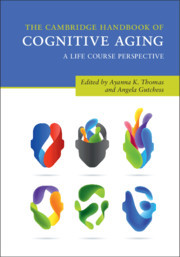The Cambridge Handbook of Cognitive Aging A Life Course Perspective Cambridge Handbooks in Psychology Series
Coordonnateurs : Thomas Ayanna K., Gutchess Angela

Angela Gutchess is Associate Professor of Psychology at Brandeis University, Massachusetts, with appointments in the Neuroscience Program and the Volen Center for Complex Systems. Her research investigates the influence of age and culture on memory and social cognition, using behavioral, neuroimaging (fMRI), electrophysiological (EEG), and patient research methods.
Date de parution : 05-2020
Ouvrage de 774 p.
18x25.2 cm
Disponible chez l'éditeur (délai d'approvisionnement : 14 jours).
Prix indicatif 218,62 €
Ajouter au panierDate de parution : 05-2020
Ouvrage de 778 p.
17.4x24.7 cm
Disponible chez l'éditeur (délai d'approvisionnement : 14 jours).
Prix indicatif 72,61 €
Ajouter au panier


